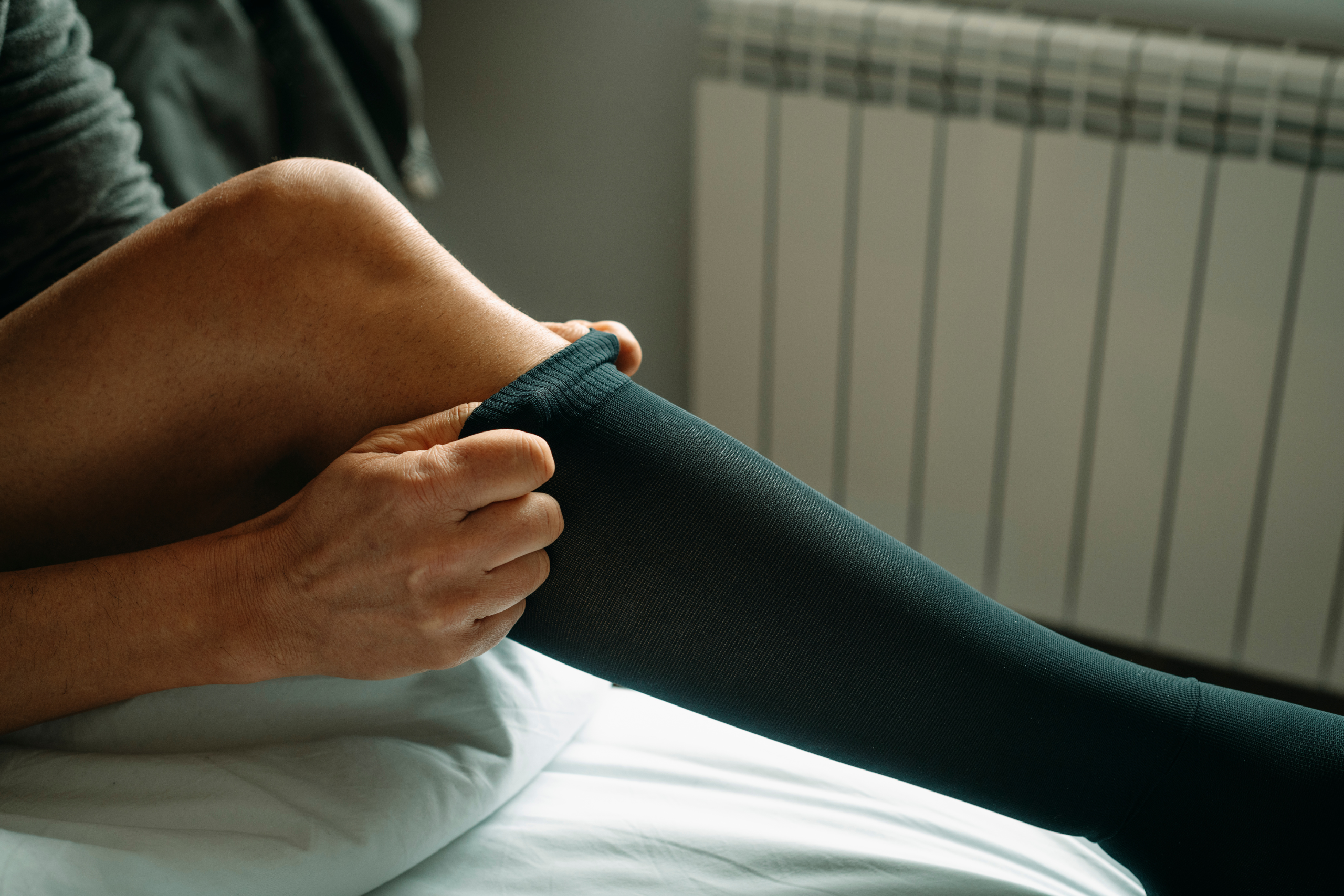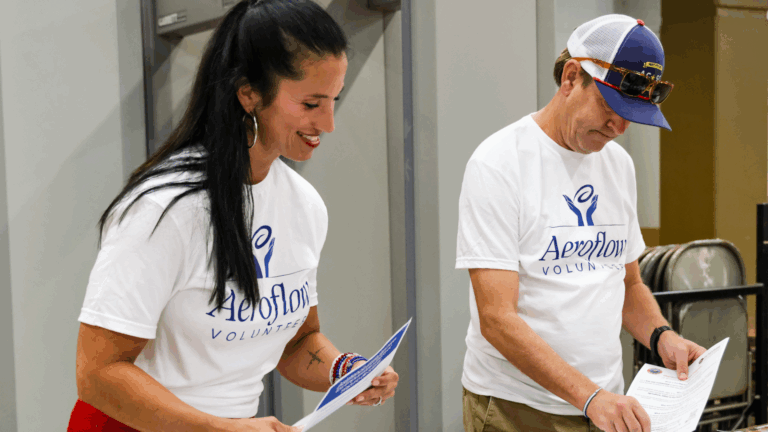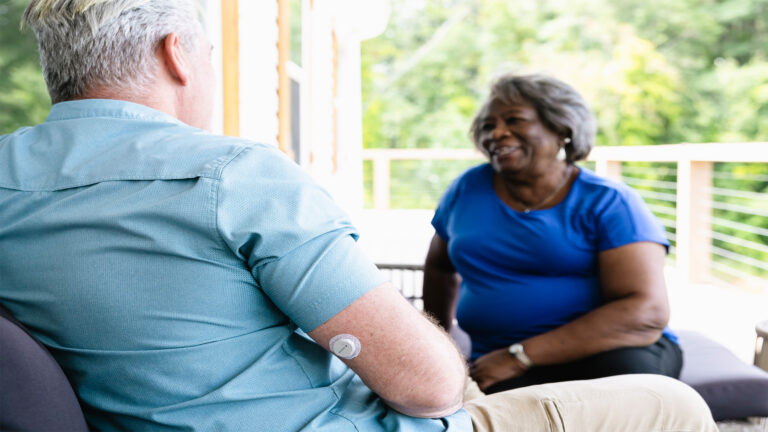What is Postpartum Edema?
Postpartum edema, or postpartum swelling, is caused by an excess amount of fluid remaining in the body tissue after childbirth. Swollen extremities (hands, feet, and ankles) and weight gain are the main symptoms of edema. Swelling can lead to the skin looking stretched and inflamed, and sometimes will cause the outer layer of the skin to look puffy or shiny.
Mild edema is extremely common — most women experience some level of swelling after giving birth. The body naturally prepares for childbirth by retaining water to help body tissue adapt to the baby’s growth and naturally eliminates this fluid post-childbirth.
Skip Ahead
- Pregnancy Swelling
- When to Call Your Doctor
- Eight Postpartum Swelling Treatments
- Compression Socks Can Help
Pregnancy Swelling
 Edema is still somewhat of a mystery but is generally attributed to changing estrogen and progesterone levels. Edema often arises during pregnancy as the growing baby and expanding uterus will put pressure on the vena cava vein running down the right side of the body. This causes blood flow to slow and excess fluid to leak into the tissue of the ankles and feet.
Edema is still somewhat of a mystery but is generally attributed to changing estrogen and progesterone levels. Edema often arises during pregnancy as the growing baby and expanding uterus will put pressure on the vena cava vein running down the right side of the body. This causes blood flow to slow and excess fluid to leak into the tissue of the ankles and feet.
IV fluids administered during childbirth can cause swelling as well — this is seen more frequently with moms who have a C-section and receive medication through an IV, or moms who receive Pitocin during labor. We see this more often with moms who have twins.
Symptoms of edema are often exacerbated on hot summer days and during the evening hours when mom has been standing for long periods of time.
Symptoms usually recede the week after childbirth as the kidneys begin to process and eliminate excess fluids. That said, many women experience swelling several weeks after the arrival of their baby. You can reduce edema through diet, exercises like swimming and garments like compression stockings that prevent painful swelling in the legs and feet.
How Long Does Postpartum Edema Last?
The postpartum swelling in your legs, feet, and hands will naturally go down within the first week after pregnancy. During this time, the body is flushing excess water from the tissue in the swollen regions. This process takes a different amount of time for everyone but can be sped up by eating a lot of healthy foods, staying hydrated and allowing the body to rest and recover.
When is Postpartum Edema a Problem?
 You should only worry when you begin to experience symptoms beyond mild to moderate swelling and discomfort. Intense pain in the legs or frequent headaches can be a sign of high blood pressure. If the swelling is located in one area or is on one side of the body, this can be a sign of a blood clot and should be immediately addressed by a physician.
You should only worry when you begin to experience symptoms beyond mild to moderate swelling and discomfort. Intense pain in the legs or frequent headaches can be a sign of high blood pressure. If the swelling is located in one area or is on one side of the body, this can be a sign of a blood clot and should be immediately addressed by a physician.
Severe edema is a dangerous condition and can lead to a life-threatening condition called preeclampsia. Signs of preeclampsia include facial swelling, morning sickness, abdominal pain, migraines and fast-paced weight gain (more than 4 lbs. a week). If you experience these symptoms, you should consult your doctor and seek treatment options. In almost all cases, postpartum swelling is nothing to worry about and is merely an inconvenience for new moms.
Can I Take Water Pills?
Any prescription water pill/diuretic is strongly discouraged during pregnancy. After pregnancy, a diuretic can help alleviate your symptoms, though this can usually be achieved through drinking a lot of water and eating foods that are natural diuretics like cucumbers and lemons. Dandelion tea has been known to prevent fluid retention as well.
8 Ways to Treat Postpartum Swelling
Relax, relax, relax! post pregnancy edema is normal and will go away. Keeping a healthy diet, resting and staying hydrated are the best things you can do to keep swelling down.
- Eat healthy foods — Snack on foods rich in protein, complex carbs, fruits and veggies and foods rich in Potassium. Avoid sodium and junk foods at all costs!
- Add nutrients to your diet — Onion and garlic improve circulation. Broccoli, tomatoes and strawberries provide vitamin C. Almonds, wheat germ and sunflower seeds give an extra boost of vitamin E.
- Drink up — It seems contradictory, but drinking lots of water will signal your body to flush out the retained fluids. Along with this, make sure you urinate often to keep the fluids from remaining any longer than necessary. Add lemons, apples, citrus fruits or cucumbers to your water for an extra boost (they’re natural diuretics).
- Sit down — Avoid standing for a long time. Don’t cross your legs while sitting; this reduces circulation. Elevate your legs above your heart for periods of 20 minutes throughout the day to improve your circulation and lessen swelling.
- Get a massage — This is a perfect time to request a massage from your partner. If you aren’t experiencing much pain, have your partner massage your legs and feet gently.
- Acupuncture treatment — This can rebalance internal energy and improve circulation.
- Stay cool — Keep your body temperature at a steady level and avoid getting too hot. Heat can significantly increase swelling.
- Compression stockings save the day — Maternity compression stockings are a lifesaver for moms who experience swelling in the lower body — put the stockings on first thing in the morning for best results.
You will find that you might sweat or urinate a lot in the days after giving birth — this is the body working to get rid of all the excess fluid and is perfectly normal.
Compression Stockings
 Compression stockings are an awesome solution for postpartum edema treatment that reduces extremity swelling during and after pregnancy. The stockings can do wonders for women who experience painful swelling in their lower legs and ankles. Compression stockings also provide relief to those suffering from varicose veins as they increase blood flow and prevent the veins from spreading or getting worse.
Compression stockings are an awesome solution for postpartum edema treatment that reduces extremity swelling during and after pregnancy. The stockings can do wonders for women who experience painful swelling in their lower legs and ankles. Compression stockings also provide relief to those suffering from varicose veins as they increase blood flow and prevent the veins from spreading or getting worse.
3 Types of compression stockings:
- Knee high compression socks support your ankle and calf.
- Thigh high compression stockings support the leg from the mid-thigh all the way to the toes.
- Full-length compression hose offers relief for back pain and supports the entire leg. These stockings begin at the waist and cover the toes for total coverage.
The stockings are available in a range of compression levels. These numbers can be confusing when you first look at them. Simply put, the higher number represents the compression level on the foot; the lower number corresponds to compression at the top of the stocking. Compression level is measured in millimeters of Mercury (mmHg). This describes the amount of pressure the wearer will feel, which is most compressed at the foot and decreases up the leg.
 The higher the compression, the tighter the stocking will feel. The pressure stocking levels usually range from light (10-15 mmHg) to firm (30-40 mmHg). Your doctor can prescribe a higher level of compression if any of these compression levels do not reduce your swelling.
The higher the compression, the tighter the stocking will feel. The pressure stocking levels usually range from light (10-15 mmHg) to firm (30-40 mmHg). Your doctor can prescribe a higher level of compression if any of these compression levels do not reduce your swelling.
If you are suffering from swollen legs, ankles and hands post-pregnancy, find comfort in knowing that there are many ways to lessen the pain and make your busy life as a new mom a bit easier. Maintaining a healthy diet that provides plenty of protein, iron, and vitamins are the best way to flush your body with unwanted fluids.
Though it seems contradictory, there is nothing better for you than drinking lots of water. Spice up your 8-10 daily glasses by infusing cucumbers, lemons or other citrus fruits — these natural diuretics will flush the kidneys and encourage your body to return to its natural state.
Aeroflow Healthcare is committed to following our mission to improve each of our patient’s quality of life through compassion, excellent service, and exceptional products.
Think a Maternity Compression garment could help you through your pregnancy and postpartum recovery?




